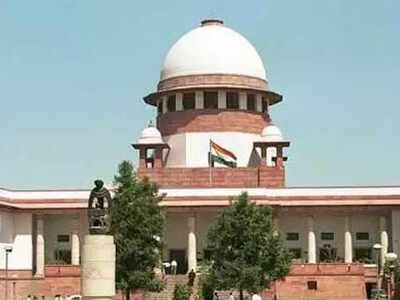
NEW DELHI: More than three decades after being sacked on the ground of moral turpitude for assaulting a person, the Supreme Court on Friday quashed State Bank of India decision to discharge the employee, saying that causing hurt could not be termed as a crime of moral turpitude.
The employee working as a messenger in SBI at Puducherry was discharged from service in 1986 after being convicted for causing hurt to a person. The bank removed him from job under section 10(1)(b)(i) of the Banking Regulation Act, 1949 which provided that conviction by a criminal court of an offence involving moral turpitude shall disentitle a person from continuing in employment of a banking company.
A bench of Justices L Nagesawara Rao and M R Shah said only those Acts which disclose depravity and wickedness of character can be categorized as offences involving moral turpitude and an offence of simple assault does not within it.
"There can be no manner of doubt about certain offences which can straightaway be termed as involving moral turpitude e.g. offences under the Prevention of Corruption of Act, NDPS Act, etc. The question that arises for our consideration in this case is whether an offence involving bodily injury can be categorized as a crime involving moral turpitude. In this case, we are concerned with an assault. It is very difficult to state that every assault is not an offence involving moral turpitude,"the bench said.
"A simple assault is different from an aggravated assault. All cases of assault or simple hurt cannot be categorized as crimes involving moral turpitude. On the other hand, the use of a dangerous weapon which can cause the death of the victim may may result in an offence involving moral turpitude. In the instant case, there was no motive for him to cause the death of the victim. The criminal courts below found that the injuries caused to the victims were simple in nature. On an overall consideration of the facts of this case, we are of the opinion that the crime committed by him does not involve moral turpitude," it said.
The HC had also in 2009 quashed the decision of bank on the ground that the trial court released the employee on probation after conviction only to permit him to continue in service. HC had also directed that he would be paid 1/4th of his salary for the period he remained out of job.
The apex court, which had stayed HC in 2009, upheld HC order but disagreed with its reasoning and quashed SBI's decision on the ground that the employee was not involved in an offence of moral turpitude.
The employee working as a messenger in SBI at Puducherry was discharged from service in 1986 after being convicted for causing hurt to a person. The bank removed him from job under section 10(1)(b)(i) of the Banking Regulation Act, 1949 which provided that conviction by a criminal court of an offence involving moral turpitude shall disentitle a person from continuing in employment of a banking company.
After fighting legal battle for almost 33 years, the bank employee P Soupramaniane got relief from the apex court which held that his termination of job was wrong as the offence for which he was convicted did not amount to moral turpitude. The sacked employee, who attained the age of superannuation in 2012 during the pendency of the case, will however be getting 1/4th of the salary from the date of discharge till the date of retirement as back wages.
A bench of Justices L Nagesawara Rao and M R Shah said only those Acts which disclose depravity and wickedness of character can be categorized as offences involving moral turpitude and an offence of simple assault does not within it.
"There can be no manner of doubt about certain offences which can straightaway be termed as involving moral turpitude e.g. offences under the Prevention of Corruption of Act, NDPS Act, etc. The question that arises for our consideration in this case is whether an offence involving bodily injury can be categorized as a crime involving moral turpitude. In this case, we are concerned with an assault. It is very difficult to state that every assault is not an offence involving moral turpitude,"the bench said.
"A simple assault is different from an aggravated assault. All cases of assault or simple hurt cannot be categorized as crimes involving moral turpitude. On the other hand, the use of a dangerous weapon which can cause the death of the victim may may result in an offence involving moral turpitude. In the instant case, there was no motive for him to cause the death of the victim. The criminal courts below found that the injuries caused to the victims were simple in nature. On an overall consideration of the facts of this case, we are of the opinion that the crime committed by him does not involve moral turpitude," it said.
The HC had also in 2009 quashed the decision of bank on the ground that the trial court released the employee on probation after conviction only to permit him to continue in service. HC had also directed that he would be paid 1/4th of his salary for the period he remained out of job.
The apex court, which had stayed HC in 2009, upheld HC order but disagreed with its reasoning and quashed SBI's decision on the ground that the employee was not involved in an offence of moral turpitude.
Download The Times of India News App for Latest India News.
#ElectionsWithTimes
more from times of india news
Elections 2019

Trending Topics
LATEST VIDEOS
More from TOI
Navbharat Times
Featured Today in Travel
Quick Links
Rajasthan election 2019Andhra Lok Sabha electionGujarat Election 2019Karnataka Election 2019MP Lok Sabha electionMaharashtra election 2019West Bengal Lok SabhaTamil Nadu election 2019UP Election 2019Bihar election 2019UP Election DateAndhra Election DateBihar Election DateAndhra Assembly ElectionLok SabhaMP Election DateMaharashtra Election DateShiv SenaYSRCPTDPWB Election DateJDUCongressBJP newsGujarat Election DateSC ST ActUIDAIIndian ArmyISRO newsSupreme CourtRajasthan Election DateTelangana Election DateTamilrockers 2018Uttarakhand newsSikkim newsOrrisa newsKarnataka Election DateNagaland newsSatta KingManipur newsMeghalaya news
Get the app










